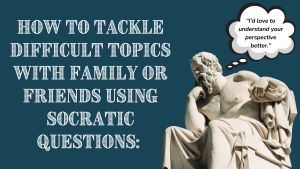
In today’s polarised world, discussing politics or social views with friends and family can feel like walking through a minefield. Emotions run high, opinions clash, and what starts as a casual chat can quickly spiral into a heated argument. But it doesn’t have to be that way. By using Socratic questioning—a method rooted in asking thoughtful, open-ended questions to explore ideas and challenge assumptions—you can foster understanding, encourage reflection, and keep the conversation productive. Below, we’ll explore how this approach works, why it’s effective, and provide specific Socratic questions to guide your next tricky discussion.

The Socratic method, inspired by the ancient Greek philosopher Socrates, isn’t about winning an argument or proving someone wrong. Instead, it’s about digging deeper into why people believe what they do, uncovering the reasoning behind their views, and inviting them to examine their own assumptions. This approach shifts the dynamic from confrontation to curiosity, making it less about “me vs. you” and more about “let’s figure this out together.” When done with genuine respect and patience, it can defuse tension and open the door to real dialogue.
Before diving into questions, set a positive tone. Start by affirming your relationship—“I really value our talks, even when we see things differently”—and express your intent: “I’d love to understand your perspective better.” This signals that you’re not out to attack or judge. Then, lean on Socratic questions to guide the discussion naturally.
Here are some practical questions to use when discussing politics or social views. They’re designed to encourage reflection, clarify thinking, and keep the conversation moving forward without escalating into a fight.
1. What do you think is the most important issue here?
This question invites the other person to prioritise their concerns, giving you insight into what drives their stance. It also helps focus the discussion on what matters most to them.
2. Why do you feel that way?
Simple but powerful, this prompts them to explain the reasoning or experiences behind their view. It’s a gentle way to dig deeper without sounding accusatory.
3. What would it look like if things were handled differently?
This encourages them to imagine alternatives, shifting the focus from defending their position to exploring possibilities. It can reveal whether they’ve considered other angles.
4. How do you think this affects people who see it the opposite way?
This question nudges them toward empathy, asking them to step into someone else’s shoes. It’s a subtle way to broaden their perspective without directly challenging their beliefs.
5. What evidence or experiences shaped your view on this?
By asking for the “why” behind their opinion, you get a window into their logic or personal story. It also invites them to reflect on whether their stance holds up under scrutiny.
6. What would change your mind?
This is a bold one—it tests how open they are to rethinking their position and highlights whether their view is flexible or rigid. If they say “nothing,” it’s a clue to pivot to a less contentious topic.
7. How do you think we could find common ground here?
This shifts the focus to collaboration, signalling that you’re not just debating for the sake of it. It can de-escalate tension and uncover shared values.
Imagine your uncle says, “The government should just stop meddling in healthcare—it’s a disaster.” Instead of firing back with stats or a counterargument, try this:
These questions don’t attack his view—they ask him to explain it. You might learn his stance comes from a frustrating personal experience, not just blind ideology, or you may want to do some more research yourself. And by listening, you build trust, making him more open to hearing your side later.
Using Socratic questions isn’t about changing someone’s mind on the spot—though it might plant seeds for reflection. It’s about understanding each other better and preserving the relationship despite differences. In a world where politics and social views can divide, asking “Why do you think that?” instead of shouting “You’re wrong!” is a small but radical act of connection. It can be very hard to do this and it takes patience and practice. Especially if you are passionate about a topic!
So, next time you’re facing a tricky subject with friends or family, give these questions a try. You might be surprised at where the conversation leads—and what you both discover along the way. What do you think—how could this approach work for you?
© The Uncensored Patriots - 2025. All rights reserved. Web design and maintenance by Consiliuma. Articles by TUP Community Members.